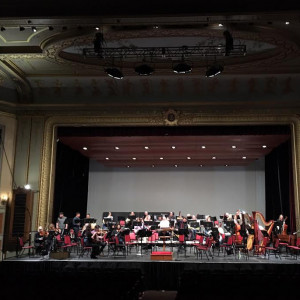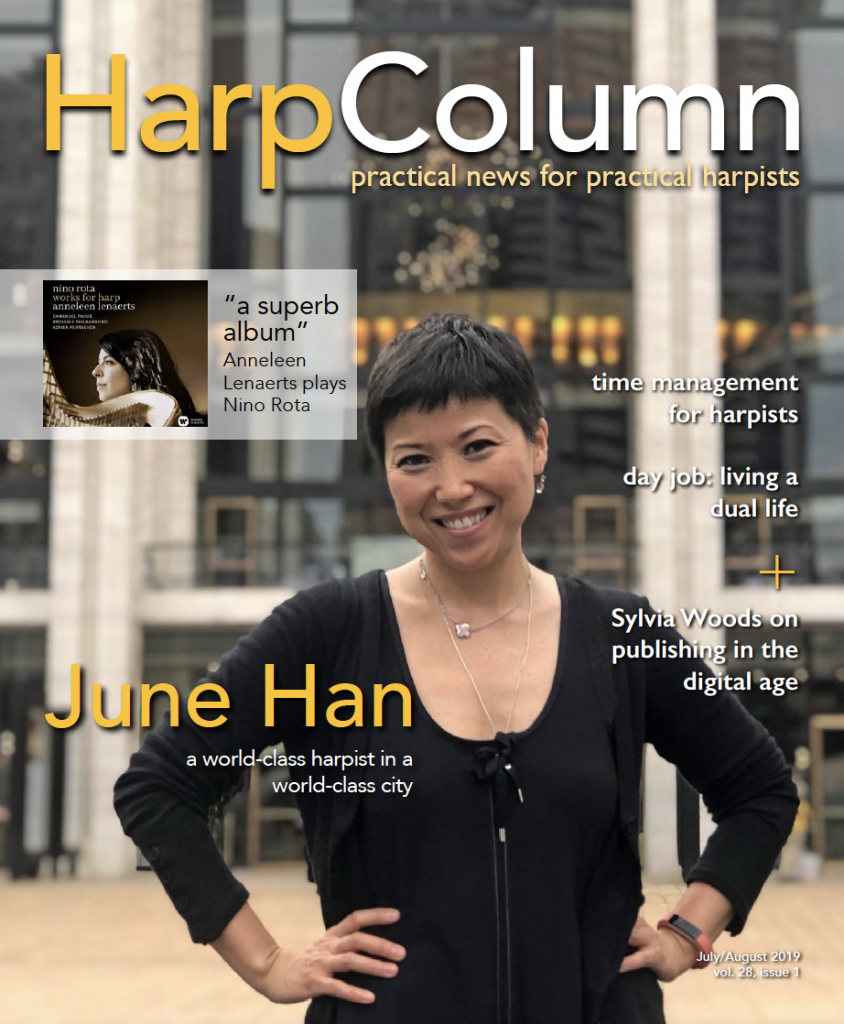“So, what do you do for a living?”
Each time I have to decline a gig, I question if this is taking me further from the career I envisioned at one point in my life. Am I okay with living this dual life?
I’ve never had a clear-cut answer to this question. After attending the Eastman School of Music with Kathleen Bride for my undergrad and studying with Sarah Bullen in Chicago for my master’s, you would think the answer would be obvious. Two degrees in harp performance means you must be a professional harpist, but it’s not that simple.
I sit at a corporate desk from 8:00 a.m. to 4:30 p.m. most days. To work colleagues, I’m a customer service supervisor. When I’m at an orchestra rehearsal or a wedding gig, I’m a professional harpist. I try to tailor my answer to the person I’m speaking with, but whatever I say feels incomplete. I’m often left wondering if I said the “right thing.” How did six years of intensive harp study land me in this dual-life?

I decided to pursue harp performance during my junior year in high school. I had interests elsewhere, but they paled in comparison to music. In my quest to become an orchestral harpist, I signed my name to half a dozen loans to cover the costs of tuition, food, and general living expenses (with maybe a little extra for the occasional night out…) The amount of each loan felt like nothing in exchange for the honor to study at prestigious schools with power-house teachers. By the time I graduated, I would certainly have the skills to support a performance career and pay back my loans, right? As I neared the end of my schooling, the reality of my situation became clearer and clearer. I had worked a variety of gigs in Chicago during graduate school to help with the cost of living, but when I started paying back loans, budgeting that gig income was a different kind of beast. I knew I would need to supplement performing with at least one other job, if not more.

During my last year in Chicago, our harp studio hosted a masterclass with Adriana Horne, who had not only won the San Francisco Ballet job earlier that year, but was also celebrating her recent win of the National Symphony Orchestra position. The masterclass was informative and Adriana’s playing was inspiring, but something she discussed afterwards hit very close to home for me. Leading up to her two successful auditions, she spent half of her time working as a supervisor at a college library. Her remaining time was spent practicing, teaching, and gigging, but the library was a main source of income. Adriana said being satisfied with her day job allowed her to put her whole self into her auditions, playing her personal style unapologetically. She said she would have been just as satisfied if nothing had changed and she returned to the library Monday morning. Relief washed over me. Having nearly finished my time in school, I had reluctantly come to terms with needing a secondary job in order to supplement my income, but felt comfort in seeing a talented harpist satisfied without a full-time performance job.
I’ve now been out in the “real world” for five years. I continue to work my day job and perform on the weekends. I’ve found success and feel pride in both of my careers, but I still feel some internal conflict. It’s a challenge to hold Adriana’s dual-life success story as inspiration for my own. With the current emphasis on social media for promoting and networking, thousands of Instagram accounts (mine included) would convince anyone of roaring success for countless musicians. It appears that every musician is playing weddings, orchestra concerts, and recitals galore. However, we all know the guise social media poses—you only see what I want you to see. For years, I’ve hidden my day job from the social media world for fear of being deemed unprofessional or at a lesser proficiency due to my need for a second job. If I need a day job to fund my life, can I really consider myself a professional harpist? I’ve been asked to rehearse during work hours and have had to decline, acknowledging only that it was due to a “conflicting commitment.” Each time I have to decline a gig, I question if this is taking me further from the career I envisioned at one point in my life. Am I okay with living this dual life?
Well, they say practice makes perfect. I’m still learning to have pride in my work, whether it’s behind a harp or behind a desk. As I’ve become more open to sharing my experience, I’ve found many harpists can relate. During the popular Instagram event #harpril where harpists shared pictures and stories on a different topic each day in April, I finally shared my story with the social media world. I received an outpouring of positivity and support from people experiencing similar dual-life narratives. For some, it was due to parenthood. For others, it was a cross-country move to start fresh. And for others still, it was a conscious choice they made along the way. The reasons may vary, but we are all pulled away from the harp at some point in our lives, whether it’s just until the weekend or for years. I’m learning I can still be successful outside of performing. Having pride in my work away from the harp does not diminish my enthusiasm for music. For now, I will continue with my dual life and will practice my confidence in what I can accomplish in all aspects of my life. I still may not have a clear answer for what I do for a living, but I have come away with one sure conclusion from speaking with others—whether I play once a day or once a decade, I will always be a harpist. •







